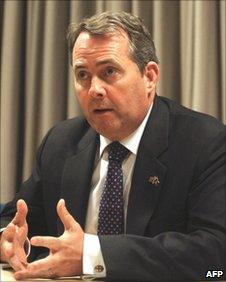Troop numbers cut not ruled out by defence secretary
- Published

Dr Fox said the review needed to deliver a "step change" in the forces
The defence secretary has refused to rule out a cut in troop numbers after the upcoming strategic defence review.
Liam Fox said the "the shape and size of our armed forces" had to change over time "in the light of the threats the country faces".
But he said the UK's nuclear deterrent would not be affected by the review.
It has been announced that chief of the defence staff, Air Chief Marshal Sir Jock Stirrup, will quit in the autumn after the review, before his term ends.
Sir Jock has been chief of the defence staff since 2006 and was asked to extend his term by the previous government. Top Ministry of Defence civil servant Sir Bill Jeffrey will also go.
The BBC's Caroline Wyatt said the move would be seen as the new government's bid to draw a line under past failings.
'Keep Britain safe'
Dr Fox told BBC One's The Politics Show that it was "very unlikely that any of the services will look exactly the same" after this year's strategic defence and security review.
"I am not saying that I have got any pre-conceived idea about the size and shape of the forces," he said.
But he added: "We can't surely be saying that we keep the shape and size of our armed forces exactly the same forever. We have to change in the light of the threats the country faces."
The defence secretary said he had long felt a need for "major MoD reform" in Whitehall, cutting costs and tackling expensive overruns on equipment projects.
"What we need in the defence review is a step change. We need to say goodbye to the Cold War," he said.
"We need to see what was legacy from that, that we will probably not need for the future of our defence, and start to invest in the areas of defence that will keep the people of Britain safe in the years ahead."
Dr Fox made made clear he was not considering scrapping the forces' final-salary pensions.
'Too politicised'
Sir Jock is likely to be replaced by an army man - either the chief of the general staff, Gen Sir David Richards, who commanded Nato forces in Afghanistan, or the vice-chief of the defence staff, Gen Sir Nicholas Houghton.
Critics say Sir Jock, a former jet pilot, has not done enough to support Britain's front-line troops in his role as the head of the armed forces and the government's principal military adviser.
There have been accusations that a poorly-equipped British army has been fighting the Taliban in Afghanistan with too few troops.
There has also been criticism of excessive spending on MoD procurement.
Dr Fox said there had been an "amicable" discussion about "what was best for the department" and it would be wrong to suggest the two men had been fired.
However, John Spellar MP, a defence minister under Labour, said Mr Fox gave the impression he was "pushing out" both men and that was "quite wrong".
"It's not only bad for them, it's bad for their successors who will inevitably then be seen as possibly being politically appointed," Mr Spellar told the BBC.
Foreign Secretary William Hague said the conclusion of the review in the autumn would be a "natural point" for a change of personnel.
Shadow defence secretary Bob Ainsworth, who worked with the outgoing pair when Labour were in government, said "both played an incredibly important role at the Ministry of Defence in often very difficult circumstances".
But Lt Col Stuart Tootle told BBC News that he believed Sir Jock should leave before the review, pointing to "a well-tried military maxim that he who plans, must also execute".
"If he sees through SDR (the strategic defence review), then the new chief of the defence staff has actually to inherit what someone else has designed," said Lt Col Tootle.
"And there's a real risk there that it may not be what the new chief wants to do."
Some senior military figures argue that the role of chief of the defence staff has become too politicised.
Rear Adm Chris Parry said: "Senior military officers have great responsibilities - they have to be politically accountable.
"But I do think that in the latter stages of the last administration some of our senior officers became politicised, and I'm afraid became too much something that wasn't independent and impartial."
Lord West, a former head of the Royal Navy, said: "I think any government needs pure military advice and if it doesn't get that sometimes, it can make terrible mistakes."
'Good course'
Permanent under secretary Sir Bill Jeffrey has been in his post since 2005.
He said he was "very glad" to see through the review, which he regarded as "a real opportunity to set defence on a good course for the future".
Some 295 British service personnel have died in Afghanistan since military operations there began in 2001 in the wake of the 9/11 attacks in the US.
British troops joined a US-led coalition that invaded the country because the Taliban in Afghanistan were accused of providing a sanctuary for al-Qaeda leader Osama Bin Laden.
Since then, efforts to help the Afghan government maintain security across the country have met resistance from Taliban insurgents.
Last week was one of the worst for Nato forces in Afghanistan since the start of the war. Some 32 Nato troops, including three Britons, have been killed since last Sunday.
- Published13 June 2010
- Published13 June 2010
- Published9 June 2010